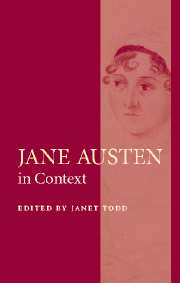11 - Critical Responses, Recent
Published online by Cambridge University Press: 19 December 2020
Summary
The present-day scene of Austen criticism is a lively and contentious one, marked by debates between, on the one side, feminist and postcolonial critics who frankly declare their own investments in the revisionary claims of their politics and, on the other, scholars who would counter such appropriation by reading Jane Austen scrupulously along the grain, circumscribing the meaning of her writings within the conditions of possibility generated by her life and times. These recent conversations have, nonetheless, resulted in mutual illumination, a significant interpenetration of methods, and some degree of agreed ground among the contending parties. This evolution has meant not only that the contemporary ‘relevance’ of (and hence interest in) Austen's work has been vastly enhanced, but also that conventional literary historical research has been pushed into many productive new directions.
One might safely claim, in any case, that the idea of a political Austen is no longer seriously challenged, since the widespread influence of Marilyn Butler's authoritative Jane Austen and the War of Ideas (1975) located her in the mainstream of intellectual ideas following the French Revolution. (Butler had not at the time included feminism among the ideas relevant to a reading of Austen's novels, an omission she made up in the introduction to the 1987 edition.)Where Austen stands on a number of contemporary issues – the Revolution, war, nationalism, empire, class, ‘improvement’, the clergy, town versus country, abolition, the professions, female emancipation; whether her politics were Tory, or Whig, or radical; whether she was a conservative or a revolutionary, or occupied a reformist position between these extremes: these are among the questions with which recent Austen scholarship has been deeply engrossed.
Jane Austen's gender as writer has never been an innocuous issue. For second-wave feminism in the Anglo-American academy engaged in canon battles and arguing for the recuperation of a tradition of women's writing, the fact of Austen's being the first major English woman writer led to interest in two questions broadly identifiable as: how might we view her within a category designated as ‘women's writing’, and how was she shaped by and how did she herself shape different literary histories?
- Type
- Chapter
- Information
- Jane Austen in Context , pp. 101 - 110Publisher: Cambridge University PressPrint publication year: 2005
- 2
- Cited by



